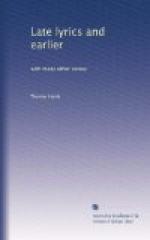These summer landscapes—clump, and copse,
and croft —
Woodland and meadowland—here hung aloft,
Gay with limp grass and leafery new and soft,
Seem caught from the immediate season’s yield
I saw last noonday shining over the field,
By rapid snatch, while still are uncongealed
The saps that in their live originals climb;
Yester’s quick greenage here set forth in mime
Just as it stands, now, at our breathing-time.
But these young foils so fresh upon each tree,
Soft verdures spread in sprouting novelty,
Are not this summer’s, though they feign to
be.
Last year their May to Michaelmas term was run,
Last autumn browned and buried every one,
And no more know they sight of any sun.
HER TEMPLE
Dear, think not that they will forget you:
—If craftsmanly art should
be mine
I will build up a temple, and set you
Therein as its
shrine.
They may say: “Why a woman such honour?”
—Be told, “O, so sweet
was her fame,
That a man heaped this splendour upon her;
None now knows
his name.”
A TWO-YEARS’ IDYLL
Yes; such it was;
Just those two seasons unsought,
Sweeping like summertide wind on our ways;
Moving, as straws,
Hearts quick as ours in those days;
Going like wind, too, and rated as nought
Save as the prelude to plays
Soon to come—larger,
life-fraught:
Yes; such it was.
“Nought”
it was called,
Even by ourselves—that
which springs
Out of the years for all flesh, first or last,
Commonplace, scrawled
Dully on days that go past.
Yet, all the while, it upbore us like wings
Even in hours overcast:
Aye, though this best thing of things,
“Nought”
it was called!
What seems it
now?
Lost: such beginning was all;
Nothing came after: romance straight forsook
Quickly somehow
Life when we sped from our nook,
Primed for new scenes with designs smart and tall
. . .
—A preface without any book,
A trumpet uplipped, but no call;
That seems it
now.
BY HENSTRIDGE CROSS AT THE YEAR’S END
(From this centuries-old cross-road the highway leads east to London, north to Bristol and Bath, west to Exeter and the Land’s End, and south to the Channel coast.)
Why go the east road now? . . .
That way a youth went on a morrow
After mirth, and he brought back sorrow
Painted upon his brow
Why go the east road now?
Why go the north road now?
Torn, leaf-strewn, as if scoured by foemen, Once
edging fiefs of my forefolk yeomen,
Fallows fat to the plough:
Why go the north road now?
Why go the west road now?
Thence to us came she, bosom-burning,
Welcome with joyousness returning . . .
—She sleeps under the bough:
Why go the west road now?




